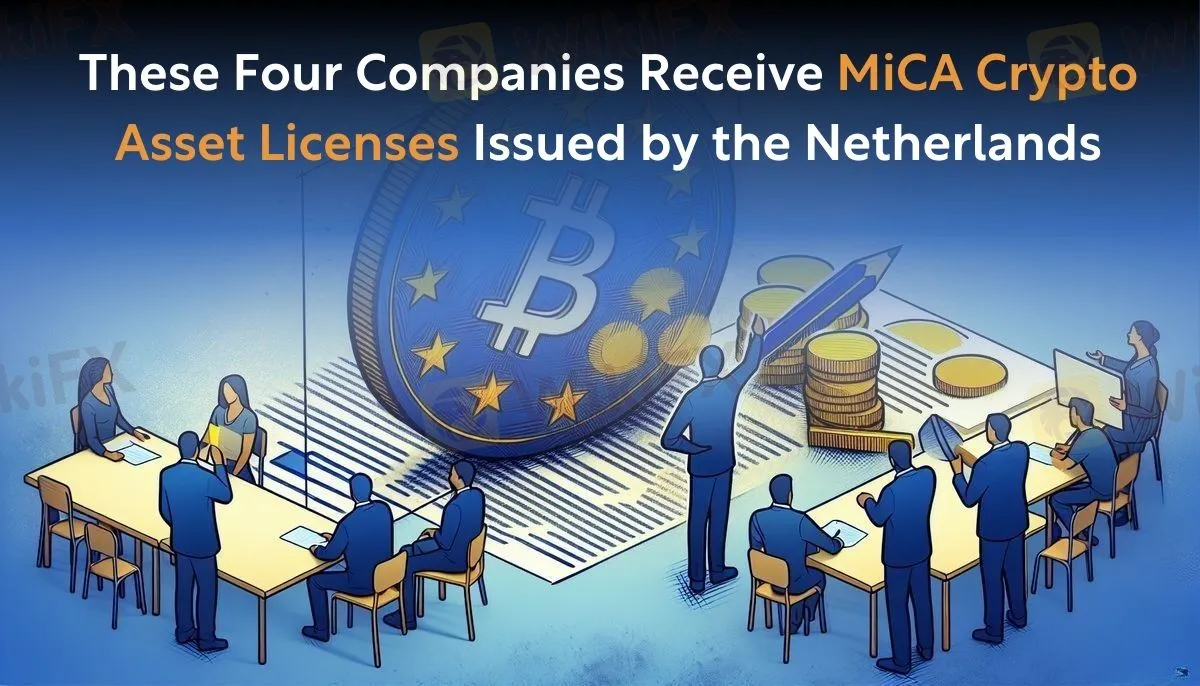简体中文
繁體中文
English
Pусский
日本語
ภาษาไทย
Tiếng Việt
Bahasa Indonesia
Español
हिन्दी
Filippiiniläinen
Français
Deutsch
Português
Türkçe
한국어
العربية
These Four Companies Receive MiCA Crypto Asset Licenses Issued by the Netherlands
Abstract:Four firms secure AFM licenses, paving the way for regulated crypto operations across the EU under MiCA regulations.

Four Crypto-Asset Service Providers Obtain Dutch AFM Licenses
According to a recent announcement by the Dutch Authority for the Financial Markets (AFM), four crypto-asset service providers — MoonPay, BitStaete, Zebedee, and Hidden Road — have successfully acquired the coveted Crypto-Asset Service Provider (CASP) licenses. This certification allows these companies to operate legally across all 27 European Union member states. The licenses represent a significant milestone for these firms, indicating their compliance with the stringent requirements set forth under the Markets in Crypto-Assets Regulation (MiCA).

Company Profiles and Services Offered
MoonPay Europe B.V.
- Address: Herengracht 420, 1017BZ Amsterdam, The Netherlands
- AFM Authorization Number: 41000002
- Authorization Type: CASP Authorization (art.63 MiCAR)
- Services Permitted:
(c) Exchange of crypto-assets for funds;
(d) Exchange of crypto-assets for other crypto-assets;
(g) Provision of transfer services for crypto-assets on behalf of clients.
BitStaete B.V.
- Address: Hesenstraat 125, 7537PA Oldenzaal, The Netherlands
- AFM Authorization Number: 41000003
- Authorization Type: CASP Authorization (art.63 MiCAR)
- Services Permitted:
(i) Portfolio management of crypto-assets.
Zebedee Europe B.V.
- Address: Vijfteelaat 68, 1071HL Amsterdam, The Netherlands
- AFM Authorization Number: 41000001
- Authorization Type: CASP Authorization (art.63 MiCAR)
- Services Permitted:
(a) Custody and administration of crypto-assets on behalf of clients;
(c) Exchange of crypto-assets for funds;
(g) Provision of transfer services for crypto-assets on behalf of clients.
Hidden Road Partners CIV NL B.V.
- Address: Raamplein 1 - Unit 2.10, 1016 KK Amsterdam, The Netherlands
- AFM Authorization Number: 41000008
- Authorization Type: CASP Notification (art.60 MiCAR)
- Services Permitted:
(e) Exchange of crypto-assets for funds;
(d) Exchange of crypto-assets for other crypto-assets;
(f) Execution of orders for crypto-assets on behalf of clients.
Background and Transition Period under MiCA
The Markets in Crypto-Assets Regulation (MiCA) was proposed by the European Commission in 2020 and came into force on June 30, 2023. However, not all provisions became immediately applicable. Rules concerning stablecoin issuers took effect on June 30, 2024, while other regulations are set to apply starting December 30, 2024.
MiCA provides a “transition period” for crypto-asset service providers. Companies already offering services before December 30, 2024, are allowed to continue operations without a license until July 1, 2026. The exact length of the transition period, however, is determined by the relevant EU member states.
As MiCA implementation approaches, it sets a clear framework for regulatory compliance in the crypto-asset industry. This framework not only ensures stability and security but also provides time for companies to adjust to the new requirements. The successful licensing of MoonPay, BitStaete, Zebedee, and Hidden Road by AFM underscores their commitment to compliance and serves as a benchmark for other companies aiming to expand into the EU market.
Disclaimer:
The views in this article only represent the author's personal views, and do not constitute investment advice on this platform. This platform does not guarantee the accuracy, completeness and timeliness of the information in the article, and will not be liable for any loss caused by the use of or reliance on the information in the article.
Read more

Breaking News: OmegaPro Caught in a $650 Million Forex and Crypto Investment Scam
An indictment was leveled against two men in the District of Puerto Rico for their alleged involvement in the operation and promotion of OmegaPro, an international investment scheme that has led to financial losses worth over $650 million for investors. Check more about this story

BaFin Issues Warnings Against Unauthorised Crypto and Investment Platforms
BaFin has recently flagged multiple websites, including stcwelt.com and mega-platz.pro, for offering financial and cryptoasset services without proper authorisation. Stay informed and protect your investments.

CryptoCurrency Regulations in India 2025 – Key Things You Should Know
Cryptocurrency has become a major trend in today’s world. Crypto Experts believe it’s the future, which is why many people are investing heavily in it. But before jumping in, it’s important for crypto enthusiasts to understand the key rules about cryptocurrency in India.

Global Brokers Vs. Indian Rules: Why They Struggle in India
RBI issued a warning last year against 75 forex brokers. Those brokers are globally popular and regulated in other countries, but they are banned in India. Only few brokers even have physical offices located in India. So, why do global brokers face so many challenges in entering the Indian market?
WikiFX Broker
Latest News
What is a Pip in Forex?
New to Forex Trading in India? Here's How You Can Start and Maximize
FXTRADING.com: A Closer Look at Its Licenses
xChief: A Closer Look at Its Licenses
Intel spins out AI robotics company RealSense with $50 million raise
Risk Involved with Cabana Capital – Every Trader Should Know
Tom Lee's Granny Shots ETF is crushing the market and raking in cash
XTB Hack 2025: Major Security Breach Exposes Client Accounts
Nvidia's Jensen Huang sells more than $36 million in stock, catching up with Warren Buffett in net worth
These are America's 10 weakest state economies most at risk in a recession
Currency Calculator


